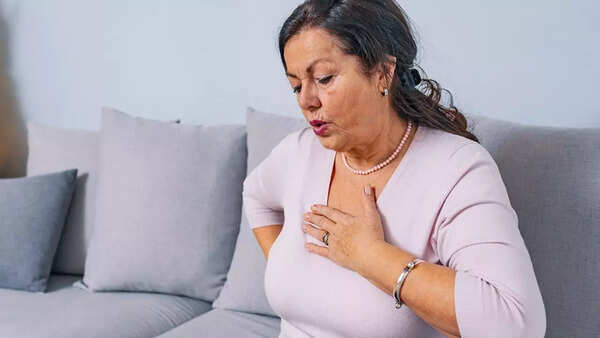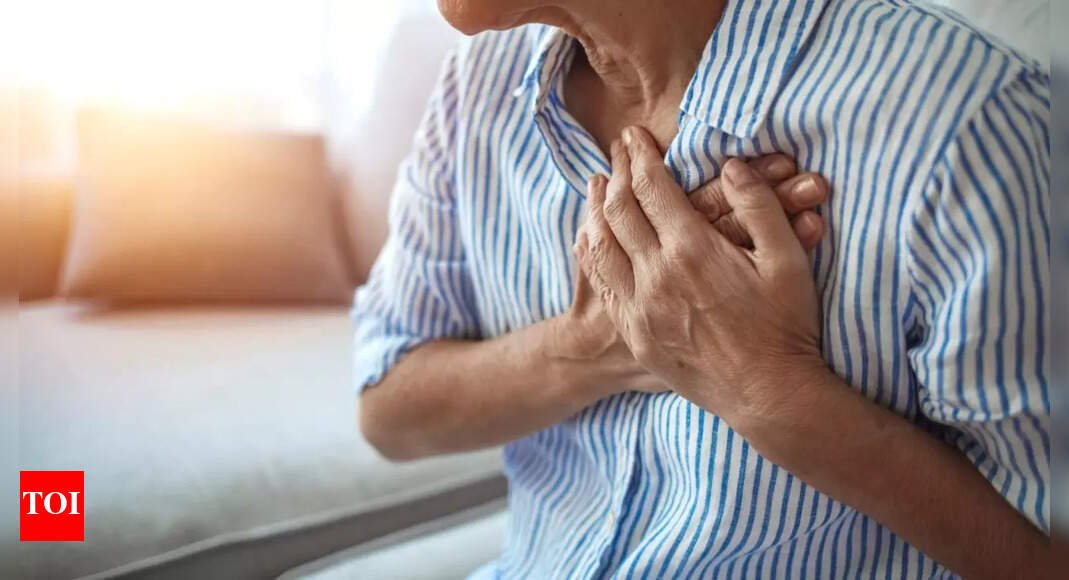Cardiovascular diseases (CVDs), including heart disease and stroke, are the leading cause of death globally, accounting for an estimated 17.9 million deaths annually, or roughly 32% of all global deaths. According to the World Health Organization (WHO), four in five of these deaths occur in low- and middle-income countries, and one-third occur prematurely in people under 70 years old.Heart disease remains the leading cause of death in the United States of America, according to the American Heart Association (AHA). Every 40 seconds, someone in the US has a heart attack, with 805,000 people experiencing a heart attack annually, according to the Centers for Disease Control and Prevention (CDC).

Although the statistics look really concerning, recognizing early warning signs of heart disease is crucial, as prompt medical response can save lives. While some heart attacks come on suddenly and intensely, there are key symptoms that individuals should not ignore.Take a look.
Chest pain or discomfort
Chest pain is the most common symptom of poor blood flow to the heart or a heart attack. This type of chest pain is called angina or angina pectoris. Chest pain can occur when the heart is not getting enough blood or oxygen. The amount and type of pain can vary from person to person. Some people may feel a crushing pain, while others feel only mild discomfort. Your chest may feel heavy or like someone is squeezing your chest or heart. You may also feel the pain under your breastbone (sternum, so the pain is called substernal, or in your neck, arms, stomach, jaw, or upper back. Chest pain from angina often occurs with activity or emotion, and goes away with rest or a medicine called nitroglycerin. Bad indigestion can also cause chest pain. Women, older adults, and people with diabetes may have little or no chest pain when they have a heart problem. Some people have symptoms other than chest pain, such as fatigue, shortness of breath, general weakness, or a change in skin color or greyish pallor (episodes of change in skin color associated with weakness).
Shortness of breath
When the heart can’t pump blood as well as it should, blood backs up in the veins that go from the lungs to the heart. Fluid leaks into the lungs and causes shortness of breath. This is a symptom of heart failure (sometimes called congestive heart failure). You may notice shortness of breath during physical activity, even while you’re resting, or when you’re lying flat on your back. That shortness of breath might even wake you from sleep.
Fatigue
Tiredness can have many causes. Sometimes it simply means that you need more rest. But feeling run down can be a sign of a more serious problem. Fatigue may be a sign of heart trouble when you feel much more tired than normal, you feel so tired that you can’t do your normal daily activities, or you have sudden, severe weakness.

Swelling in the legs, ankles, or feet
Swelling (edema) in your lower legs is another sign of a heart problem. When your heart doesn’t work as well, blood flow slows and backs up in the veins in your legs. This causes fluid to build up in your tissues. You may also have swelling in your stomach or notice some weight gain.
Dizziness or fainting
Dizziness or sudden unexplained loss of consciousness can be a sign of heart disease. This may occur due to arrhythmias (irregular heartbeats) or other heart-related issues. If you experience frequent dizziness or fainting, it’s important to consult a healthcare provider.
Palpitations
If your heart can’t pump blood as well, it may beat faster to try to keep up. You may feel your heart racing or throbbing. A fast or uneven heartbeat can also be a sign of an arrhythmia. This is a problem with your heart rate or rhythm.

Persistent coughing or wheezing
Coughing or wheezing that doesn’t go away can be another sign that fluid is building up in your lungs. You may also cough up mucus that is pink or bloody.
Nocturia (frequent nighttime urination)
Frequent nighttime urination can be a subtle sign of heart failure. When lying down, fluid that has accumulated in the legs during the day can return to the bloodstream and be filtered by the kidneys, leading to increased urination.
Skin discoloration
If you notice a change in skin color, such as a bluish or purplish tint, in a comfortable temperature, it could be an indication of poor blood circulation due to blockage of blood vessels. This can be a sign of various cardiovascular issues, including heart failure and peripheral artery disease.Heart disease often presents with subtle symptoms that can be easily overlooked. Being aware of these early warning signs and seeking timely medical evaluation can significantly improve outcomes. If you experience any of the symptoms mentioned above, consult a healthcare provider promptly to ensure your heart health is properly assessed and managed.
var _mfq = window._mfq || [];
_mfq.push([“setVariable”, “toi_titan”, window.location.href]);
!(function(f, b, e, v, n, t, s) {
function loadFBEvents(isFBCampaignActive) {
if (!isFBCampaignActive) {
return;
}
(function(f, b, e, v, n, t, s) {
if (f.fbq) return;
n = f.fbq = function() {
n.callMethod ? n.callMethod(…arguments) : n.queue.push(arguments);
};
if (!f._fbq) f._fbq = n;
n.push = n;
n.loaded = !0;
n.version = ‘2.0’;
n.queue = [];
t = b.createElement(e);
t.async = !0;
t.defer = !0;
t.src = v;
s = b.getElementsByTagName(e)[0];
s.parentNode.insertBefore(t, s);
})(f, b, e, ‘https://connect.facebook.net/en_US/fbevents.js’, n, t, s);
fbq(‘init’, ‘593671331875494’);
fbq(‘track’, ‘PageView’);
};
function loadGtagEvents(isGoogleCampaignActive) {
if (!isGoogleCampaignActive) {
return;
}
var id = document.getElementById(‘toi-plus-google-campaign’);
if (id) {
return;
}
(function(f, b, e, v, n, t, s) {
t = b.createElement(e);
t.async = !0;
t.defer = !0;
t.src = v;
t.id = ‘toi-plus-google-campaign’;
s = b.getElementsByTagName(e)[0];
s.parentNode.insertBefore(t, s);
})(f, b, e, ‘https://www.googletagmanager.com/gtag/js?id=AW-877820074’, n, t, s);
};
function loadSurvicateJs(allowedSurvicateSections = []){
const section = window.location.pathname.split(‘/’)[1]
const isHomePageAllowed = window.location.pathname === ‘/’ && allowedSurvicateSections.includes(‘homepage’)
const ifAllowedOnAllPages = allowedSurvicateSections && allowedSurvicateSections.includes(‘all’);
if(allowedSurvicateSections.includes(section) || isHomePageAllowed || ifAllowedOnAllPages){
(function(w) {
function setAttributes() {
var prime_user_status = window.isPrime ? ‘paid’ : ‘free’ ;
var geoLocation = window?.geoinfo?.CountryCode ? window?.geoinfo?.CountryCode : ‘IN’ ;
w._sva.setVisitorTraits({
toi_user_subscription_status : prime_user_status,
toi_user_geolocation : geoLocation
});
}
if (w._sva && w._sva.setVisitorTraits) {
setAttributes();
} else {
w.addEventListener(“SurvicateReady”, setAttributes);
}
var s = document.createElement(‘script’);
s.src=”https://survey.survicate.com/workspaces/0be6ae9845d14a7c8ff08a7a00bd9b21/web_surveys.js”;
s.async = true;
var e = document.getElementsByTagName(‘script’)[0];
e.parentNode.insertBefore(s, e);
})(window);
}
}
window.TimesApps = window.TimesApps || {};
var TimesApps = window.TimesApps;
TimesApps.toiPlusEvents = function(config) {
var isConfigAvailable = “toiplus_site_settings” in f && “isFBCampaignActive” in f.toiplus_site_settings && “isGoogleCampaignActive” in f.toiplus_site_settings;
var isPrimeUser = window.isPrime;
var isPrimeUserLayout = window.isPrimeUserLayout;
if (isConfigAvailable && !isPrimeUser) {
loadGtagEvents(f.toiplus_site_settings.isGoogleCampaignActive);
loadFBEvents(f.toiplus_site_settings.isFBCampaignActive);
loadSurvicateJs(f.toiplus_site_settings.allowedSurvicateSections);
} else {
var JarvisUrl=”https://jarvis.indiatimes.com/v1/feeds/toi_plus/site_settings/643526e21443833f0c454615?db_env=published”;
window.getFromClient(JarvisUrl, function(config){
if (config) {
const allowedSectionSuricate = (isPrimeUserLayout) ? config?.allowedSurvicatePrimeSections : config?.allowedSurvicateSections
loadGtagEvents(config?.isGoogleCampaignActive);
loadFBEvents(config?.isFBCampaignActive);
loadSurvicateJs(allowedSectionSuricate);
}
})
}
};
})(
window,
document,
‘script’,
);
#Heart #distress #silent #symptoms #shouldnt #overlook



